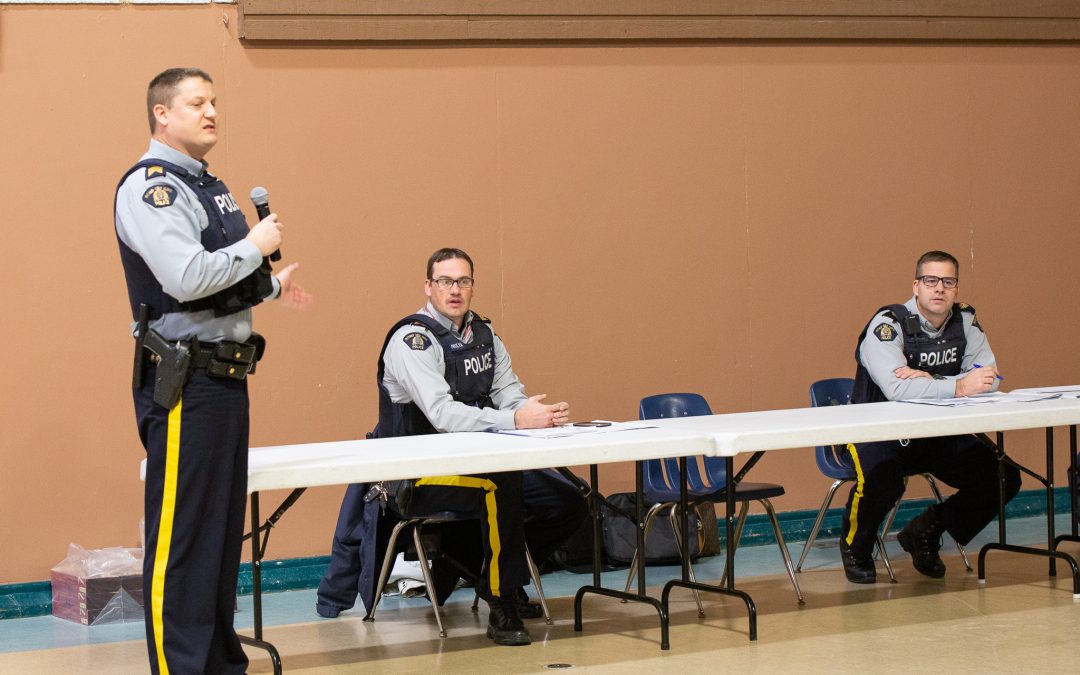About 40 people attended an RCMP town hall meeting at Kikinahk Friendship Centre on Wednesday night in La Ronge.
Kyle Watson is the staff sergeant at the RCMP’s La Ronge detachment.
While there is a reduction in violent crimes, mischief numbers have increased slightly.
The La Ronge RCMP detachment has a permanent General Investigation Section (GIS) unit and it is attributed to the decrease in violent crimes. A corporal and a constable make up the GIS and they investigate criminal offenses, such as fraud, drugs and gang related matters.
“Some of the investigations that we do up here take up a lot of time,” says staff sergeant Watson. “If we can give the time consuming investigations to the GIS guys, who have the time to work on it and focus on that one investigation, it frees up my constables and they can go back on the road.”
The rise in mischief numbers could be attributed to more people calling in to 911 to report crime.
“The mischiefs are anybody who is causing issue to other people’s property. It could be an inebriant walking down the street, yelling and swearing at people,” explains Watson, “or it could be that same inebriant kicking down a door. It could be property crime or broken windows. Mischief is almost like a catch-all. It catches a wide variety of stuff.”
Staff Sergeant Watson still encourages people to call in with any suspicious behavior, even if they feel like it may not be a very pressing matter; it may help the Mounties connect the dots in an on-going investigation.
The RCMP are trying different methods to deal with individuals who are often associated with mischief calls. Instead of putting them behind bars due to repeat intoxication offenses, they are testing a Cell Block Referral Card program.
“We are trying different strategies to deal with some social issues. The Cell Block Cards are specific for when we have inebriates come through. They’ve done nothing wrong, they have an alcohol problem, that’s a social issue,” says Watson. “We don’t have a mechanism in place to deal with the inebriate. It falls on our shoulders, so we are trying to do intervention work with them. They receive a referral card to help get them treatment at the hospital or addiction services.”
He says that maybe this strategy won’t help, but they will keep offering it in hopes that even one or two people utilize the referral program.
Many bands are implementing community safety watch programs around Saskatchewan, and the tri-community is no exception. Staff sergeant Watson says these programs are beneficial to his detachment, but people need to remember to keep themselves safe first and foremost.
“These are community issues and they can be and should be dealt with at a local level. It helps free us up, at the same time they need to be careful walking into a situation where they could get hurt,” says staff sergeant Watson.
Questions from the tri-community members were mostly focused on property damage. Staff sergeant Watson reminds everyone to practice simple habits to keep their belonging safe. He suggests keeping homes and companies well-lit at night, displaying alarm system signs and stickers and keeping bikes inside or in locked sheds.
Detachments from across the province have been hosting meetings in their communities and many of their problems mirror the issues that the RCMP in La Ronge are facing.
(Photo: Staff Sgt. Kyle Watson (left), former La Ronge detachment commander Sgt. Richard Price (centre), Sgt. Josh Hallett (right) hosting RCMP La Ronge town hall. Photo by David Smith)
